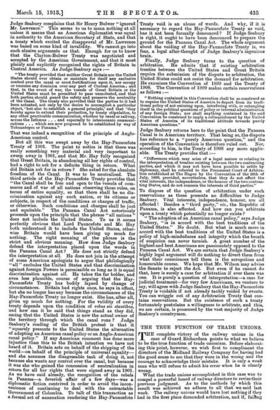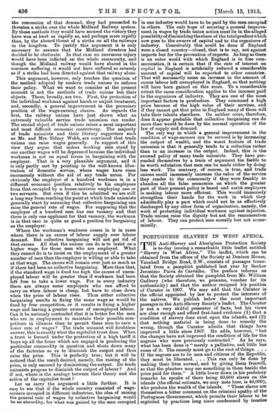THE TRUE FUNCTION OF TRADE UNIONS. T HE complete victory of
the railway unions in the case of Guard Richardson points to what we believe to be the true function of trade unionism. Before elaborat- ing this point, however, we wish first to compliment the directors of the Midland Railway Company for. having had the good sense to see that they were in the wrong and the courage to acknowledge their mistake. It is only a weak man who will refuse to admit his error when he is clearly wrong. What the trade unions accomplished in this case was to compel a powerful board of railway directors to revise their previous judgment. As to the methods by which this result was achieved we adhere to all that we said last week. The railway unions would have lost nothing if they had in the first place demanded arbitration, and if, failing the concession of that demand, they had proceeded to threaten a strike over the whole Midland Railway system.
By these methods they would have secured the victory they have won at least as rapidly as, and perhaps more rapidly than, by the absurd threat of a strike on all the railways in the kingdom. To justify this argument it is only necessary to assume that the Midland directors had decided to be obstinate. In that case an enormous injury would have been inflicted on the whole community, and though the Midland railway would have shared in the common suffering it would not have suffered so severely as if a strike had been directed against that railway alone.
This argument, however, only touches the question of the method adopted by modern trade unions to enforce their policy. "What we want to consider at the present moment is not the methods of trade unions but their objects. These, broadly, are two. First, the protection of the individual workman against harsh or unjust treatment, and, secondly, a general improvement in the pecuniary position of the wage-earning classes. As regards the first, the railway unions have just shown what an extremely valuable service trade unionism can render. The second object of trade unions raises a most important and most difficult economic controversy. The majority of trade unionists and their literary supporters such as Mr. and Mrs. Sidney Webb, are convinced that trade unions can raise wages generally. In support of this view they argue that unless working men stand by one another wages will be depressed because the individual workman is not on equal terms in bargaining with the employer. That is a very plausible argument, and it is only partly met by pointing to the well-known illus- tration of domestic service, where wages have risen enormously without the aid of any trade union. For obviously the employer of a hundred workmen is in a different economic position relatively to his employees from that occupied by a house-mistress employing one or two servants. But even if this be admitted we are still a long way from reaching the point at which trade unionists generally start by assuming that collective bargaining can raise the general rate of wages. For supposing that the employer of a hundred men has one vacancy and that there is only one applicant for that vacancy, the workman is in that case in quite as good a position for bargaining as the employer.
Where the workman's weakness comes in is in cases where there is an excess of labour supply over labour demand. But collective bargaining will not get rid of that excess. All that the unions can do is to insist on a higher wage for those men who are employed. What they cannot do is to insist on the employment of a greater number of men than the employer is willing or able to take at that wage. The excess will remain over just as much as if there had been no collective bargaining. More than that, if the standard wage is fixed too high the excess of unem- ployed labour will be greater than if workmen had been left free to take a lower wage. For in every industry there are always some employers who can afford to carry on when labour is cheap, but have to close down when the price of labour rises. Thus either collective bargaining results in fixing the same wage as would be fixed by free competition, or it results in fixing a higher wage and leaving a greater excess of unemployed labour. Can it be seriously contended that it is better for the men who are in employment to maintain their possible com- petitors in idleness than to permit these men to earn a lower rate of wages ? The trade unionist will doubtless answer, this is exactly what the capitalist trust does. When a trust is formed under the protection of a high tariff it buys up all the firms which are engaged in producing the particular commodity in question and shuts down many of the factories so as to diminish the output and thus raise the price. This is perfectly true; but it will be noticed that the result desired, namely, the raising of the price, is only secured by diminishing the output. Do trade unionists propose to diminish the output of labour ? And if not, where is the analogy between their theory and the action of the capitalist trust ? Let us carry the argument a little further. It is easy to see that if the whole country consisted of wage- earners occupied in different industries, the idea of raising the general rate of wages by collective bargaining would be an absurdity, for what was gained by the men occupied in one industry would have to be paid by the men occupied' in others. The only hope of securing a general improve- ment in wages by trade union action must lie in the alleged possibilityofdiminishing the share of the total product which now goes to the owners of capital and to the organizers of industry. Conceivably this could be done if England were a closed country—closed, that is to say, not against imports but for the prevention of exports. As long as there is an outer world with which England is in free com- munication, it is certain that if the rate of interest on capital in England is artificially reduced a considerable amount of capital will be exported to other countries. That will necessarily mean an increase in the amount of excess labour left unemployed in England, so that nothing will have been gained on this score. To a considerable extent the same consideration applies to the incomes paid to the organizers of industry. They are one of the most important factors in production. They command a high price because of the high value of their services, and if they cannot get that price in England ninny of them will take their talents elsewhere. On neither score, therefore, does it appear probable that collective bargaining can do more than would be done by the normal operation of the law of supply and demand. The only way in which a general improvement in the condition of wage-earners can be secured is by increasing the output of wealth, and the worst feature of trade unionism is that it generally tends to a reduction rather than to an increase in the output. Indeed, this is the• avowed policy of many trade unionists. They have per- suaded themselves by a train of argument too feeble to be worth refutation that men can be made richer by doing less work. The contrary, of course, is true, and trade unions could immensely increase the value of the service they render to the community if they were frankly to abandon all the false economics on which the greater part of their present policy is based and assist employers in making labour more efficient. This would immensely strengthen their hands for the work in which they admittedly play a part which could not be as effectively discharged by any other form of organization, namely, the work of protecting individual workmen against injustice. Trade unions raise the dignity but not the remuneration of labour. They can protect men morally but not econo- mically.















































 Previous page
Previous page